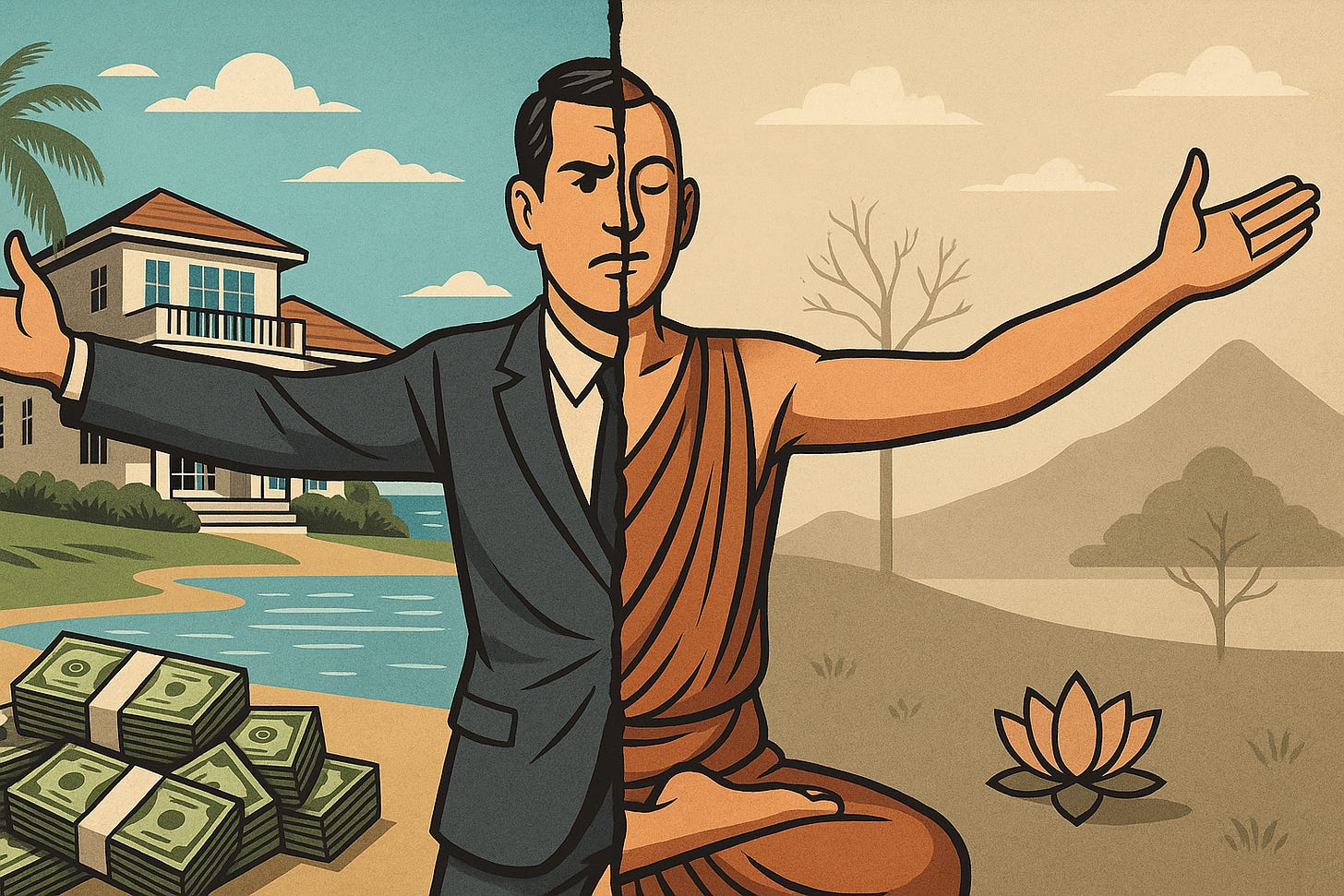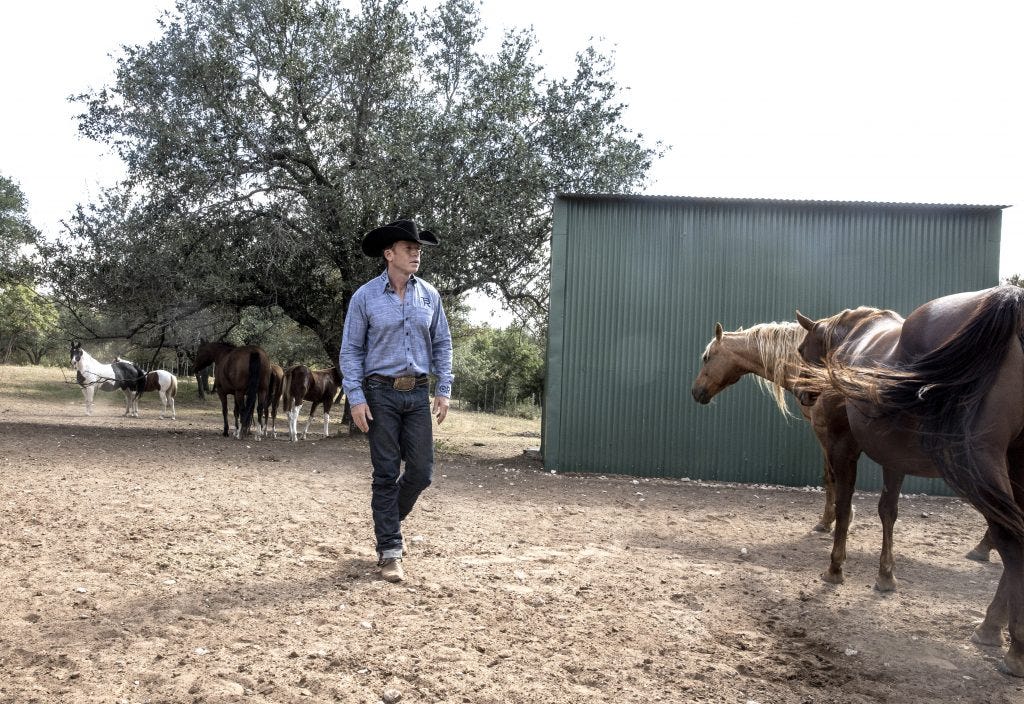The Constraint Paradox
and Taylor Sheridan's extreme productivity vs Mr. Money Mustache's extreme frugality
At 40, with a failing acting career and a pregnant wife, Taylor Sheridan had run out of options.
His resume was twenty years struggling in LA as an actor and being 10th on the call sheet. His one big break was getting a minor recurring role on Sons of Anarchy. And yet when his son was born and he asked for a raise, the producers told him: “You’re never going to be a star. This is what you’re worth,” and killed off his character in the show.
For Sheridan, this was a life changing moment:
“How can I look this kid in the eye and say, ‘You can do anything you want to do, be anything you want to be. Sorry, I’m not going to see your baseball game. I got a Windex audition at five.’”
With a newborn and a dead acting career, the choice was clear: find a new way to make money or fail his family.
Faced with this deadline, he succeeded through finding his calling in screenwriting: writing hits like Sicario, Hell or High Water, and Wind River within a successive three years and in doing so, creating a whole new genre of western films in Hollywood.
What makes Sheridan’s story exceptional isn’t just his dramatic late stage career transformation: it’s what he later did with that hard-won success, making an unconventional bet that would prove just as audacious as his original pivot.
By 2020, Sheridan had accumulated $20 million off of the success of his movies and new hit show Yellowstone. Suddenly an infamous mega-ranch in Texas came on the market for $350 million dollars in a “once in a lifetime buying opportunity”. So he locked himself into a huge deal with Paramount Plus for the next 10 years.
But to buy the ranch, he signed a new contract reportedly worth $200 million and wrangled some additional investors to bridge the gap.
“I was real rich for 45 minutes,” he says. “Then I was broke again. That was the trade.”
The Opposite Effect
But money constraints as a forcing function doesn’t only work in one direction. Consider the opposite extreme in Mr. Money Mustache (MMM). A typical day for him is one where he visits a puzzle factory, hangs around the house doing chores, and maybe take his e-bike around his neighborhood in Boulder, CO to run errands to save on gas costs. If you haven’t guessed already, Pete Adney, his real name, retired in 2005.
But he’s unique as a retiree as one of the originators of the financial independence retire early (FIRE) movement. At the age of 30, he decided to retire on the $600K he had saved up when him and his wife were also expecting their first son. By using the 4% rule, he calculated that $2K/month was “more than enough” for his family going forward.
Like Sheridan’s commitment towards buying a mega-ranch, MMM’s self-imposed financial budget became a forcing function, just in the opposite direction. He removed an entire categories of decisions from his life. No more “should I take this higher-paying job” or “can I get a maid to clean the house?”
Each question was instantly answerable and part of his commitment towards living on his own terms and attacking the excess of “consumerism and waste” in America.
“Once, on an otherwise beautiful day, I found myself in the crawl space in the basement crawling through my own shit,” he said. A D.I.Y. plumbing mishap involving a tree root had led to a sewer-line backup. “For me, that was a nice memory, a nice lesson: always cross your ‘t’s.”
For MMM his life could have gone down in obscurity except for the one day in 2011 he started writing his thoughts onto a blog that has since received millions of visitors per month. And incredibly enough, he found himself making hundreds of thousands of dollars from different affiliate revenue sources on his blog. Of which he donated a substantial amount of to bring himself back to a lower and more comfortable nest egg number.
The Constraint Paradox
I’ve been curious about the paradox of constraints and freedom. Most people want more freedom in their lives: more optionality for their career, hobbies, relationships. But when given unlimited choice, we become overwhelmed by it.
We treat unlimited choice as freedom: more paths, more possibilities, more control. But it’s clear that constraints don’t limit you, they liberate you from the paralysis of optionality.
Sheridan didn’t need to buy the infamous Four Sixes Ranch after becoming a huge hit in Hollywood. But buying it locked him into another decade of extreme productivity. He used massive commitments as forcing functions.
MMM by capping his spending to $2K/month discovered that he spent even less in retirement. But also found ways to find value in his pursuits of writing, re-building his home, or even fixing his own sewer line while knee deep in poop. While one embraced maximum financial pressure, the other embraced maximum financial restraint.
Both found clarity through their constraints.
The question might then be: what kind of constraints are worth holding yourself to?
I’ve felt paralyzed for years trying to figure out what I want, largely because I’ve avoided imposing constraints in my pursuit of freedom.
I was never stuck the way Sheridan originally was. But starting a business that brought me freedom has created a paradox of choice at every inflection point. I could let it coast, shut it down, scale it, or work on something new. But with all options available, it’s been difficult to choose a direction. As long as I don’t commit, I can’t choose wrong.
This is what freedom reveals: when the external pressures lift and you have enough money, enough time, enough options, many of us discover we’ve lost touch with our own wanting.
So we look for new constraints to impose.
Sometimes I imagine pulling a Sheridan: buying a huge vacation surf home in Santa Cruz with a massive mortgage that would force me to pursue and execute the biggest bets. Or going full MMM, deciding I have enough and finding meaning through minimalism instead.
Many times I think about this Youtube video: a man from Scotland flies to Vegas with his closest friends and family to risk his entire life savings on one roulette spin*. In one setting, he outsourced his life choices to fate and chance. Lose, and he’d have a new chapter of perseverance from nothing. Win, and fate says it’s time to use the money to explore your true passions.
Sometimes I’m envious of how he was able to outsourced his agency and life direction to chance. But the truth is that we’re stuck with our own agency. The question is understanding what kind of constraint we’re willing to impose, and how permanent we want it to be to induce our true life’s journey.
[1]. Funnily enough he has a second video of himself 15 years later betting $14K this time instead of his life savings of $136K.



